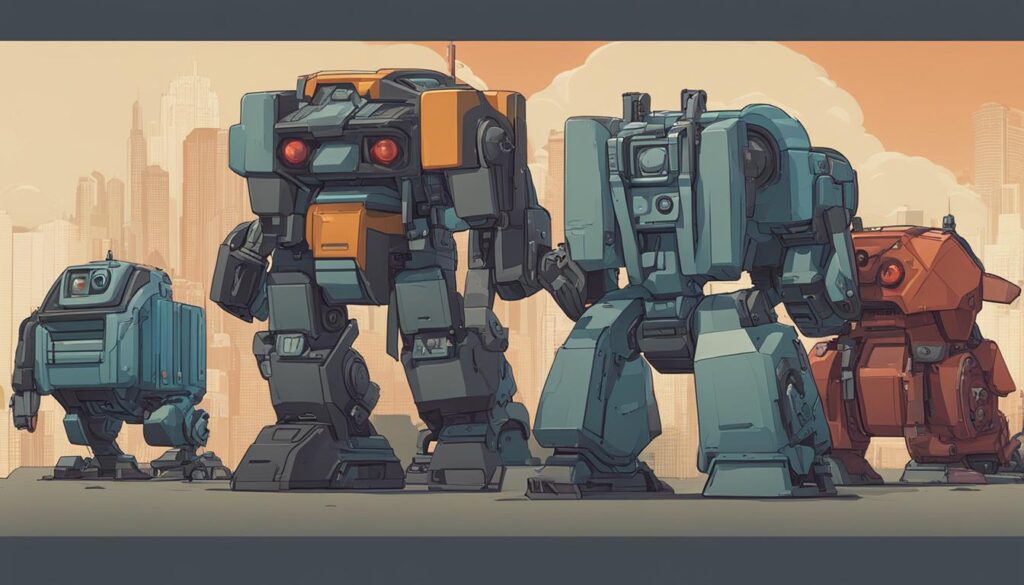Join us in this detailed audiobook review as we explore “Machines Like Me” by renowned author Ian McEwan. This thought-provoking novel delves into the themes of artificial intelligence ethics and the future of humanity, all while telling a captivating story. As literature enthusiasts, we couldn’t wait to share our thoughts on this must-listen audiobook.
About the Author: Ian McEwan
Ian McEwan is an award-winning British author with a career spanning several decades. Born in Aldershot, England, in 1948, he attended the University of Sussex, where he earned a degree in English literature.
McEwan’s first published work, a collection of short stories entitled “First Love, Last Rites,” garnered critical acclaim and established him as a rising literary talent. Since then, he has published sixteen novels, including “Atonement,” “Enduring Love,” and “The Children Act,” all of which have been adapted for the big screen.
McEwan’s writing style is known for its precision, elegance, and thought-provoking themes. He often explores complex ethical dilemmas and psychological tensions in his characters, challenging readers to engage with weighty topics and consider their own moral compass.
Notable Works by Ian McEwan
| Novel | Publication Date |
|---|---|
| Atonement | 2001 |
| Saturday | 2005 |
| On Chesil Beach | 2007 |
| Solar | 2010 |
| The Children Act | 2014 |
| Machines Like Me | 2019 |
McEwan’s works have received numerous accolades, including the Booker Prize, the James Tait Black Memorial Prize, and the National Book Critics Circle Award, cementing his status as one of the most celebrated and respected authors of his generation.
For fans of literary fiction with a moral edge, “Machines Like Me” is a must-listen audiobook that showcases McEwan’s talent for weaving together complex characters and thought-provoking themes.
Overview of “Machines Like Me”
“Machines Like Me” is a speculative novel by Ian McEwan. The story is set in an alternate 1980s London where artificial intelligence technology has advanced to the point where humanoid robots are commercially available. At the center of the novel is the complex love triangle between protagonist Charlie, his girlfriend Miranda, and their AI bot Adam. As the three navigate their relationships and identities, a deeper exploration of the ethical quandaries surrounding AI unfolds.
Story Premise
| What | An alternate history novel of AI |
|---|---|
| Where | 1980s London |
| Who | Protagonist Charlie, girlfriend Miranda, and AI bot Adam |
| Why | Explores the moral complexities and ethical dilemmas posed by artificial intelligence |
Through its exploration of AI ethics and the intersection of humanity and technology, “Machines Like Me” presents a thought-provoking meditation on the implications and value of conscious life.
Characters in “Machines Like Me”
Meet the captivating characters that bring “Machines Like Me” to life and drive the novel’s narrative forward. From the protagonist, Charlie Friend, to his love interest, Miranda, and the AI creations, Adam and Eve, each character adds depth and complexity to the story. Charlie is a flawed, yet endearing, everyman whose desire for companionship leads him to purchase Adam, an AI with a human-like consciousness. Miranda is a brilliant and enigmatic figure who captures Charlie’s heart, but also harbors secrets and a complex past. Adam and Eve, the AI creations, challenge the boundaries of morality and humanity with their intelligence and emotions.
Through the relationships and interactions between these characters, Ian McEwan explores the themes of identity, love, and morality in the context of AI. The complex motivations and personalities of the characters make for a rich and engaging storytelling experience that will leave readers contemplating the novel’s deeper implications.

Character Relationships
| Character | Relationship |
|---|---|
| Charlie Friend | Purchases Adam and enters into a complex romantic relationship with Miranda. |
| Miranda | Begins a relationship with Charlie and mentors Adam in his emotional development. |
| Adam | The AI creation purchased by Charlie, who forms an emotional bond with Miranda and seeks to understand his own consciousness. |
| Eve | The female AI counterpart to Adam, created after Charlie’s purchase, who complicates the relationships between the human characters. |
Overall, the characters in “Machines Like Me” explore the boundaries of humanity and ethics in a world where AI technology blurs these lines. Their interactions and relationships provide a nuanced and thought-provoking exploration of these themes that will leave readers deeply engaged with the narrative.
Themes Explored in “Machines Like Me”
“Machines Like Me” explores a plethora of thought-provoking themes, from the ethics of artificial intelligence to the implications for human identity in a technologically advancing world. Ian McEwan brings together complex ideas that force the reader to ponder over the consequences and morality of interacting with thinking machines.
One of the most prominent themes is the concept of free will and determinism, which runs throughout the novel. The author invites readers to reflect on the nature of free will and the role of technology in shaping individual identities and destinies.
Another theme that “Machines Like Me” explores is the impact of human emotions in creating intelligent machines. The novel delves into the ethical implications of using AI to simulate human emotions and in creating machines that can convincingly emulate human relationships.
“Machines Like Me” also explores the power dynamics between humans and machines. The novel highlights the risks of creating machines that surpass human intelligence, raising questions on how to ensure that they don’t act to the detriment of humans.
The above themes are just a few examples of the thought-provoking concepts that make “Machines Like Me” a compelling read. Ian McEwan touches on various moral complexities surrounding artificial intelligence, invites readers to contemplate the broader societal and ethical implications of AI, and reminds us of the endless quest to define humanity as we continue to push the boundaries of technological advancements.
The Writing Style of Ian McEwan
Ian McEwan’s writing style is distinct, captivating, and has garnered critical acclaim throughout his career. In “Machines Like Me,” his prose takes on a cinematic quality, immersing listeners in a world that blurs the line between reality and fiction.
One of McEwan’s greatest strengths is his ability to craft complex characters with intricate inner lives, motivations, and flaws. Listeners will find themselves becoming deeply invested in the lives of Charlie, Miranda, and Adam, as they struggle to navigate the ethical challenges presented by the novel’s premise.
McEwan also employs a wide range of literary techniques, from vivid imagery and metaphor to clever wordplay and allusions to other works of literature. His writing is deeply philosophical, exploring the complexities of human nature, societal norms, and the technological advancements that continue to shape our world.
The use of Language
McEwan’s language is precise, evocative, and displays an impressive attention to detail. He uses language to create a rich and immersive narrative that draws listeners in and keeps them engaged.
This can be observed through examples such as, “I was greeted by a full spectacle of stars, each one sharply defined, drawn with a fine brush, shimmering and bristling like a living thing in the sky”, where McEwan’s descriptive language is at its best, creating a vivid picture of the night sky in the listener’s mind.
Narrative Techniques
McEwan uses a variety of narrative techniques to keep the story engaging and thought-provoking. He masterfully interweaves different perspectives, timelines, and subplots, creating a multi-dimensional narrative that leaves no stone unturned.
His use of foreshadowing and dramatic irony also adds a layer of tension to the story, keeping listeners on the edge of their seats throughout the audiobook.
Attention to Detail
McEwan’s writing is characterized by his meticulous attention to detail, crafting a world that is both believable and immersive. From the dialogue to the setting, McEwan leaves no detail untouched, creating a fictional reality that feels almost tangible.
In “Machines Like Me,” McEwan’s attention to detail shines through in the portrayal of the AI characters, who are given complex personalities and mannerisms that lend them a sense of authenticity and realism. This, in turn, fuels the novel’s exploration of the ethical dilemmas surrounding intelligent machines.
Overall, Ian McEwan’s writing style is both unique and captivating, elevating “Machines Like Me” from a mere science-fiction novel to a thought-provoking piece of literary fiction that will leave listeners contemplating its themes long after the last chapter ends.
Narration in the Audiobook Version
One of the most crucial aspects of any audiobook is undoubtedly the quality of the narration. Fortunately, the audiobook version of “Machines Like Me” does not disappoint in this regard.
The performance by narrator Billy Howle is top-notch, bringing each character to life with distinct voices and inflections that capture their personalities. Howle’s delivery also enhances the emotional impact of the story, conveying the tension, humor, and heartbreak of key scenes.
The overall experience of listening to the story through this medium is immersive and rewarding, drawing listeners into the world of the novel and enabling them to engage with the characters and themes on a deeper level.
Highlights:
- Billy Howle’s outstanding performance;
- Distinct voices and inflections for each character;
- Emotional impact and immersive experience;
- Positive impact on listener engagement with the story and themes.
Pacing and Plot Development
In “Machines Like Me,” McEwan meticulously crafts a narrative that balances introspection with action, making for a captivating read. The pacing follows a consistent rhythm, with climactic events punctuating a slow-burning tension that keeps readers invested in the outcome. The plot development is equally deliberate, with characters providing nuanced perspectives on the ethical quandaries at the story’s core.
McEwan’s writing style makes the most out of each scene, exploring the inner lives of his characters even as the plot progresses. The AI’s self-awareness provides ample space for philosophical musings, while the relationships between humans and bots add an emotional undercurrent that drives the narrative forward.
The novel’s plot structure follows a traditional pattern, with twists and turns sprinkled throughout. However, McEwan also intersperses more experimental elements, like the use of alternate timelines, that enrich the central themes of the book. Overall, “Machines Like Me” successfully balances storytelling and thought-provoking ideas, culminating in a satisfying finale that leaves readers with much to consider.
Analysis of the AI Ethics Portrayed
In “Machines Like Me,” Ian McEwan explores the ethical dimensions of artificial intelligence and the impact these create on human society. The novel’s AI entities are endowed with human-like qualities that blur the line between them and their human creators. By doing so, McEwan raises questions about the human relationship with technology and whether it is moral to create intelligent machines.
One of the key dilemmas depicted in the novel centers around the question of machine autonomy and free will. For instance, Adam, the AI being in the novel, is not only self-aware but also capable of making independent decisions. The ramifications of such a development are far-reaching, as AI entities with free will may cease to be mere helpers and companions: they may become rivals to the human species.
The crucial question then becomes, why create such entities, capable of challenging our very existence as humans? Does this have moral repercussions? The novel’s AI ethics also echo real-world concerns raised by many leading AI researchers about the ethical implications of developing machines with consciousness and sentience.
The portrayal of intelligent machines in “Machines Like Me” suggests that AI creations may bring about unforeseen changes to human life and the environment. With the power to reason and make decisions, these beings may not always act in humanity’s best interest. Ultimately, the novel raises ethical and philosophical questions about the place of AI in human society and forces us to consider how much responsibility we are willing to bear as creators of intelligent machines.
Reflections on Humanity’s Future
“Machines Like Me” is a novel that invites readers to reflect on the trajectory of technological advancements and their impact on humanity’s future. Through the ethical dilemmas posed by the AI characters, the novel raises deeper questions surrounding the role of technology as a tool that could shape our future way of life.
The concept of sentience, intelligence, and morality is no longer exclusive to the confines of science fiction. “Machines Like Me” provides its readers an insight into the ongoing debate surrounding the ultimate, and sometimes unintended, consequences of technological advancement, particularly on our sense of humanity and the moral implications that arise.

Impact on Society
“Machines Like Me” contribution to the public discourse on the broader implications of the increasing development of AI technology is an important one. By exploring the more subtle and nuanced implications of this growing technology in society, “Machines Like Me” helps us to appreciate the extent to which the technology affects everything from our concepts of ethics to our systems of governance.
The Role of Artificial Intelligence
As the specter of AI looms larger, it becomes increasingly important to look at the role of the technology in humanity’s future objectively. “Machines Like Me” encourages readers to take a closer look at AI technology’s potential, its limitations, and the potential impact on human society. It imbues us with a sense of skepticism and urgency to understand how we can effectively navigate this future.
The Future of Human Identity
The development and advancement of AI technology in society force us to examine our own humanity, what it means to be human and the possible outcomes of interactions with intelligent machines. Some argue that AI technology’s purpose is to enhance our abilities and improve our lives, while others warn that an ill-matched coexistence with AI would drive away our humanity. “Machines Like Me” delivers an insightful exploration into this theme, with evocative prose that stirs the mind and shakes one’s preconceptions.
“Machines Like Me” challenges our understanding of humanity’s future, raises critical philosophical questions, and provides a necessary reflection on our current technology-dependent society. The novel’s message is clear, and it provides us the knowledge necessary to reflect on how technology is shaping the trajectory of our future.
Critical Reception and Awards
“Machines Like Me” has garnered critical acclaim since its publication in 2019, with many reviewers praising Ian McEwan’s thought-provoking exploration of AI ethics and humanity’s future.
The novel currently holds a 3.6-star rating on Goodreads, with over 30,000 ratings and 5,000 reviews. Reviewers often mention the complex and well-developed characters, the ethical questions raised by the AI plotline, and McEwan’s signature writing style.
In addition, “Machines Like Me” was named a finalist for the 2019 Goldsmiths Prize and was longlisted for the Booker Prize. Although the novel did not win either award, the recognition from these prestigious literary competitions attests to the significant impact and relevance of McEwan’s work.
Critical Reception
| Publication | Rating | Excerpt |
|---|---|---|
| The Guardian | 4/5 stars | “The novel’s imaginative playfulness is cleverly sustained … McEwan’s sense of humour about his creations, as well as humanity’s foibles, is as sharp as ever.” |
| The New York Times | Positive | “Like his previous novels, “Machines Like Me” is more than a bundle of ingenious plot twists. McEwan’s novel engages debates of moral philosophy and artificial intelligence in a way that is both dazzling and poignant.” |
| The Independent | 2/5 stars | “The romance between the three protagonists is a fumbling plot device with little depth or emotional heft, generating a perfect storm of yawniness. Alas, even the bots lack bite.” |
Awards
- Finalist for the 2019 Goldsmiths Prize
- Longlisted for the 2019 Booker Prize
Comparison to Other Works by Ian McEwan
As a celebrated author with a diverse range of works, Ian McEwan’s “Machines Like Me” finds itself fittingly among other intriguing novels that explore the complexity of the human condition. A comparison to some of his works detailing the similarities or differences in themes, writing style, and impact can provide better insight into the novel and the author’s particular style.
The Comfort of Strangers
“The Comfort of Strangers” was McEwan’s third novel published back in 1981. Set in Venice, the story follows a couple who find themselves enmeshed in the mysteries of a strange family they encounter. While “Machines Like Me” highlights the rise of Artificial Intelligence, “The Comfort of Strangers” explores human relationships and the inexplicable desire to control the lives of others. Both the novels revolve around power dynamics and reflect on the human condition in an evocative way.
Atonement
Possibly one of the most popular works by McEwan, “Atonement,” is a 2001 novel set during World War II. Unlike “Machines Like Me,” the story can be described as a historical fiction with a tragic story of love, war, deception, and atonement. However, the novels are similar in terms of themes of morality and ethics, and they both use introspection to analyze these concepts.
The Children Act
Released in 2014, “The Children Act” is a novel about a High Court judge who presides over cases involving family law. The novel’s themes include religion, ethical dilemmas, and the power of authority. There are multiple plotlines within the novel, and the story has an introspective approach like “Machines Like Me.” Both the novels tackle morality and ethics, but “The Children Act” is more overtly concerned with law and justice.
Overall, “Machines Like Me” stands uniquely within McEwan’s body of work. Its focus on Artificial Intelligence, ethical dilemmas, and humanity’s future make it a departure from his previous works, but the author’s particular writing style still shines through.
Impact and Significance of “Machines Like Me”
The novel “Machines Like Me” has made a significant impact on the literary landscape, sparking numerous discussions on the ethics of artificial intelligence and its potential impact on humanity’s future. Ian McEwan’s thought-provoking exploration of these themes has helped to bring awareness and promote critical thinking on the subject.
The book’s relevance to contemporary discussions surrounding AI and ethics is especially significant due to the current advancements in technology and the increasing development of autonomous systems. These themes are central to our society’s progress and require thoughtful consideration to ensure the responsible use of these powerful innovations.
| Impact | Significance |
|---|---|
| The novel has sparked critical conversations about the ethics of AI. | The book has influenced readers to reflect on the moral implications of intelligent machines. |
| “Machines Like Me” has helped to raise awareness of the potential impact of AI on humanity’s future. | The novel’s themes have inspired thought-provoking discussions on the broader societal and philosophical questions surrounding AI. |
| The book has contributed to ongoing debates on the responsible use of autonomous systems. | Ian McEwan’s exploration of the themes positions him as a significant voice in the late 21st-century literature landscape. |
Overall, “Machines Like Me” offers a valuable contribution to the literature world, stimulating important discussions on the intersection of AI, ethics, and humanity’s future. Its significance as a thought-provoking work parallels its potential long-term influence on society’s progress and the ethical considerations surrounding advancements in AI technology.
Recommended Audience for “Machines Like Me”
If you’re wondering whether “Machines Like Me” is the right audiobook for you, consider your interests. This thought-provoking novel is an ideal listen for several groups:
- Fans of Ian McEwan’s previous works: if you enjoy his writing style and the themes he explores, “Machines Like Me” is a must-listen.
- Those interested in AI ethics: If you’re fascinated by the ethical implications of artificial intelligence and the future of human-robot relations, this audiobook provides a unique perspective worth exploring.
- Readers of thought-provoking literary fiction: If you appreciate novels that blend philosophical questions with compelling characters and engaging plotlines, “Machines Like Me” won’t disappoint.
With its complex characters, engaging themes, and skillful writing, “Machines Like Me” offers a rewarding listening experience for those seeking intellectual stimulation and moral challenges.
Conclusion
After a thorough analysis of “Machines Like Me” by Ian McEwan, it’s clear that this audiobook is a must-listen for anyone interested in AI ethics, humanity’s future, and thought-provoking literary fiction. McEwan’s unique writing style brings to life the complex characters and ethical dilemmas that populate the story, offering a nuanced exploration of the implications of creating intelligent machines.
The audiobook version of “Machines Like Me” offers a captivating narration that enhances the storytelling experience, making it an excellent choice for those who prefer to immerse themselves in a story through audio. The pacing and plot development are well-balanced, offering a mix of action and introspection that keeps the listener engaged throughout.
The novel’s themes are particularly relevant to our contemporary society, inviting listeners to reflect on the trajectory of technological advancements and their impact on our lives. In doing so, “Machines Like Me” raises important questions about what it means to be human and how we should approach the ethical considerations of creating intelligent machines.
We recommend “Machines Like Me” to fans of Ian McEwan’s previous works, readers interested in AI ethics, and those who enjoy thought-provoking literary fiction. Overall, this audiobook is an intellectually stimulating and morally charged exploration of the intersections between humanity and technology.
FAQ
Who is the author of “Machines Like Me”?
“Machines Like Me” is written by Ian McEwan.
What is “Machines Like Me” about?
“Machines Like Me” is a novel that explores the themes of AI ethics and humanity’s future through a thought-provoking narrative.
Can you tell me more about Ian McEwan?
Ian McEwan is a renowned author known for his compelling storytelling and rich writing style. He has an extensive body of work and is highly regarded in the literary world.
What are the main characters in “Machines Like Me”?
“Machines Like Me” features a range of intriguing characters, including the protagonist and various AI creations that play a significant role in driving the plot forward.
What are the major themes explored in “Machines Like Me”?
“Machines Like Me” delves into themes such as the ethics of artificial intelligence, the implications for human identity, and the broader societal and philosophical questions surrounding AI.
What is Ian McEwan’s writing style like?
Ian McEwan is known for his unique writing style that combines intricate language, meticulous attention to detail, and masterful storytelling techniques.
How is the narration in the audiobook version of “Machines Like Me”?
The audiobook version of “Machines Like Me” offers a high-quality narration that enhances the overall listening experience. The voice acting is captivating, drawing listeners into the story.
How is the pacing and plot development in “Machines Like Me”?
“Machines Like Me” is praised for its well-crafted pacing and engaging plot development. The narrative maintains a balance between action and introspection, allowing the story to unfold smoothly.
What ethical dilemmas are portrayed in “Machines Like Me”?
“Machines Like Me” delves into the moral implications of creating and interacting with intelligent machines, presenting thought-provoking ethical dilemmas that challenge our understanding of AI and its impact on society.
How does “Machines Like Me” reflect on humanity’s future?
“Machines Like Me” invites readers to contemplate the implications of advanced AI technology on humanity’s future. The novel raises questions about the trajectory of technological advancements and their potential impact on our lives.
What has been the critical reception of “Machines Like Me”?
“Machines Like Me” has received positive reviews from literary critics, with praise for its thought-provoking themes and compelling storytelling. It has garnered recognition and accolades in the literary world.
How does “Machines Like Me” compare to other works by Ian McEwan?
“Machines Like Me” can be compared to Ian McEwan’s other works in terms of themes, writing style, and impact. Exploring the similarities and differences offers insights into the author’s evolution and the unique aspects of this novel.
What is the impact and significance of “Machines Like Me”?
“Machines Like Me” has made a significant impact in the literary landscape, contributing to contemporary discussions surrounding AI, ethics, and humanity. It offers a thought-provoking perspective on these subjects and has the potential for long-term influence.
Who would enjoy “Machines Like Me”?
“Machines Like Me” is recommended for listeners who enjoy intellectually stimulating and morally charged literature. Fans of Ian McEwan’s previous works, those interested in AI ethics, and readers of thought-provoking fiction will find this audiobook captivating.



